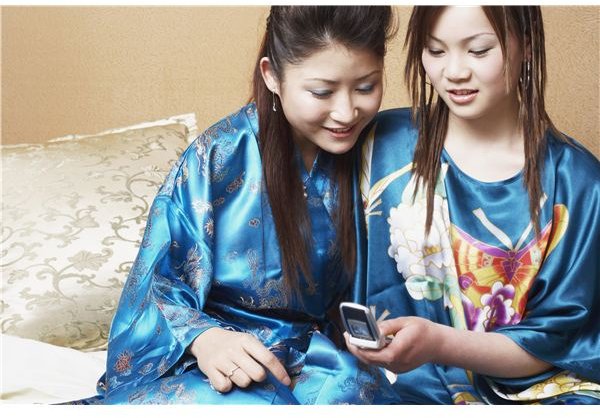Influence of American Culture on Chinese Culture: Be There or Be Square
Be There or Be Square
This situation was presented in a beginning text in China. It is not at all remarkable unless you consider the fact that during the lifetime of Chairman Mao (only thirty years ago), the use of English was considered politically suspicious.
A foreign student, a female, texts a Chinese language teacher she is fond of. This is a beginning text; the language is simple:
周五晚上七点半礼堂门口不见不散
Zhōuwǔ wǎnshang qīdiǎn bàn lǐtáng ménkǒu, bú jiàn bú sàn
Pronunciation Guide: The consonants here are pronounced just as we do in English. I have only provided guides for the vowel pronunciation. B**aahba** is like Baa Baa Black Sheep with an elongated a (aah) as the first and a shortened a (ah) as the second.
Loosely translated, this is equivalent to the English expression “be there or be square”. More on this later…
The Passage Translated
Zhōuwǔ (a_z_ure; t_oe_ wooo) - Friday
The Chinese have a simple way of naming weekdays. Monday is day one (yī ), Tuesday is day two (èr) followed by day three (sān), day four (sì), and finally, for Friday, day five (wǔ).
wǎnshang (b_aah_b_a)_ - evening
The Chinese divide up the day almost as we do.There is an early morning, a late morning, a noon, a late afternoon, and an early evening called wǎnshang, the top of the night. Shàng is the top.
Then comes qī (chee_se) diǎn (b_aah_ba) bàn ( baahb_a) - seven thirty
Literally, this means seven o’clock and a half. You can already count up to five; liù is six, and qī is seven.
lǐtáng ménkǒu - auditorium front door
Lǐtáng(ch**eese, baahba) is auditorium, and ménkǒu (men, toe**) means front door or front gate.
Bú Jiàn Bú Sàn and Its Meaning
And now we get to bú jiàn bú sàn: bú (b**oo) jiàn (baahba**) bú sàn (baahb_a_).
The point is that “bú jiàn bú sàn” does not actually mean “be there or be square.” This should be obvious since “be there or be square” is American slang and does not literally mean anything. Actually bú jiàn bú sàn literally means “No meeting, no leaving” or “We should not leave until we meet.”
Slang expressions do not necessarily exist to make literal sense, and both of these phrases exist to rhyme. “Bú Jiàn Bú Sàn” and “Be There or be Square” don’t have any direct meaning in either language. The Chinese culture has gone from rejecting English as an imperial language to embracing it with its nuances and idiomatic expressions.
A Story From the Chinese Past
There is a wonderful Chinese documentary about a group of Chinese engineers who were commissioned to build a railroad across Africa in the 1960s. As the project was set to begin, the Cultural Revolution began in China. Despite the fact that everyone involved in the project spoke English, the Chinese felt that, to be safe, they had to speak only Chinese, and there was nothing to do but to teach all the African engineers Chinese. Some African engineers simply had to leave the project due to language difficulties. The project forged a close bond between Chinese and African participants, but it demonstrates the difficulties faced by an earlier generation of Chinese speakers.
Chinese hostility to English is a figment of the past. One can listen to a Chinese-English language radio station and hear a one-hour broadcast analyzing verbal banter, accents, and nuances in movies such as My Super Ex-Girlfriend when this movie was a big teenage hit from 2007.
The Hit Song and the Movie
“Bú JiànBú Sàn, Be There or Be Square” became a big hit on the Chinese soft rock scene as a ballad. It does not take too much imagination to think about a love song that has as its chorus “Bú JiànBú Sàn, Be There or Be Square”, and then the rest of the song is in Chinese.
This was also a movie. Two young Chinese meet in Los Angeles, neither with very good jobs,The young girl is called back to China, and sometime later the man returns, and, by coincidence, the two meet again in China.The young woman is unhappy and returns to Los Angeles and, eventually the young man returns to LA, and they meet again.This time the young man’s mother is sick, and he returns to China. She also returns at a later time, and independently they are both on the same plane going back to Los Angeles. They are sitting next to each other on the plane.The pilot announces the plane is having engine difficulty, and the worst can be expected. The couple realizes this may be their last moment together. They kiss.The pilot announces that the plane has miraculously been saved.The movie ends.
Such uses of American expressions further show the influence of American slang on Chinese culture.
